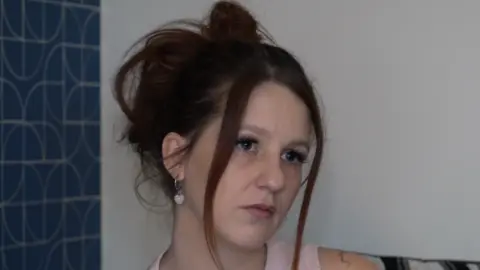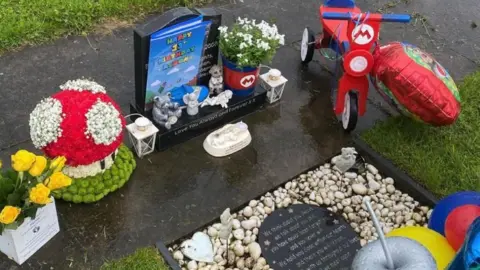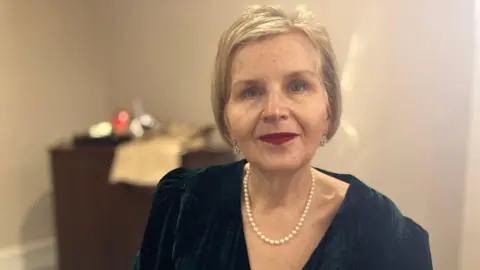'My baby died after I was sent home from hospital'
 BBC
BBCA bereaved mother whose baby died 21 hours after birth has said she feels failed by hospital staff who sent her home while in labour.
Melissa Warman was admitted to Birmingham Women's Hospital on 19 November after her water broke, but sent home after two days to await an induction date.
Losing "a hell of a lot of water", she returned to hospital on 23 November and was sent away again, two days later her daughter died, following an emergency caesarean.
Birmingham Women's and Children's NHS Trust said it was supporting the family and working with them on an investigation.
Ms Warman, from Birmingham, said she had called the hospital repeatedly before she was readmitted but was reassured she would continue to lose water until she gave birth.
"I was in agony," she said. "It wasn't a pain like a contraction, it was a pain like a lot of burning and it was very low down and that was the last time I felt her, it felt like a jolt."
When she returned for the third time, on 24 November, Nova's heart rate was found by medics to be extremely low.
"They pinned me down, they stripped me naked, it was like almost it was my fault. But it isn't my fault, they left me," Ms Warman said.
"She was born at 7 o'clock, resuscitated at birth and then at 3 o'clock in the morning she had to have CPR. She died twice, she was brain dead."
'I know I'm not alone'
The mother said medics should have induced her earlier, rather than sticking to a planned date of 37-weeks gestation.
"Those doctors on that round, they've really failed us," she said.
"I just feel alone and I know I'm not because there's so many other mums out there that have gone through it."
Her partner Jordan Smith said: "I want justice for my daughter, to be honest. I want someone held responsible."
Daljit Athwal, chief nursing and midwifery officer at the hospital trust, offered "deepest sympathies" to the family.
"The safety of our maternity services is our highest priority," she said.
"We are working alongside the family on an ongoing investigation, which will involve representation independent to our trust, to ensure the questions they have involving the care provided are answered fully."
 Victoria Richins
Victoria RichinsDonna Ockenden, the senior midwife who oversaw an inquiry into catastrophic maternity failures at the Shrewsbury and Telford NHS Trust, said she was beginning to see improvements in services, but more needed be done.
She is currently leading an inquiry into hundreds of baby deaths and injuries at Nottingham University Hospitals NHS Trust.
Ms Ockenden said deprivation was still a key factor key in determining the standard of service mothers received.
"Reports coming out [are] telling us that the gap between the haves and have nots, women in more comfortable environments to those living in deprivation, are much worse," she said.
"Minority ethnic women and, actually, disadvantaged white women are getting much worse outcomes from maternity care."
Victoria Richins, whose son Kyron was stillborn almost 17 years ago at Birmingham Women's Hospital, said she felt angry people were "still having to bury their babies."
A High Court hearing in 2022 found care in her case was negligent in the hours leading up to her suffering a massive placenta abruption after being admitted at just over 29 weeks pregnant.
But she lost the case after the judge concluded evidence provided in court by a medical expert did not prove Kyron would have otherwise survived.
Ms Richins, who disputes the judgement, said she felt let down by both medical and judicial systems and her experiences left her with complex post traumatic stress disorder.
"I don't have closure," Ms Richins said. "Even after this whole process that I've been through.
She is continuing to fight for answers. "I think it'll torture me until the day that I die."

The trust apologised some elements of the care provided to her "did not meet standards expected.
It added it had thoroughly reviewed her case and its findings had been communicated in full.
Chief medical officer Dr Satish Rao said: "Throughout the internal investigations and subsequent legal proceedings, which concluded by way of civil trial in 2022, our trust acted with full honesty and transparency."
He added ensuring the "safest care" to the thousands of women and children supported each year remained the trust's "highest priority".
Follow BBC Birmingham on BBC Sounds, Facebook, X and Instagram.
